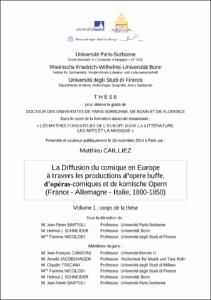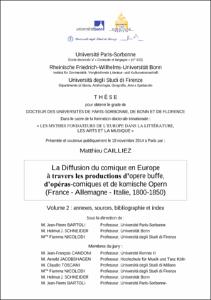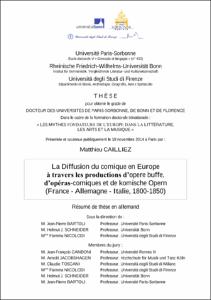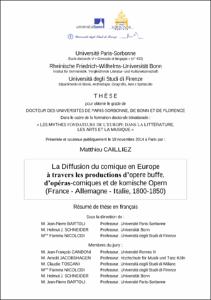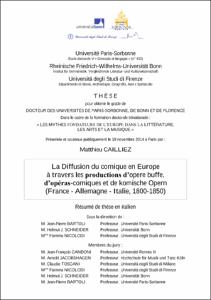La Diffusion du comique en Europe à travers les productions d’opere buffe, d’opéras-comiques et de komische Opern (France - Allemagne - Italie, 1800-1850)

La Diffusion du comique en Europe à travers les productions d’opere buffe, d’opéras-comiques et de komische Opern (France - Allemagne - Italie, 1800-1850)

| dc.contributor.advisor | Candoni, Jean-François | |
| dc.contributor.author | Cailliez, Matthieu | |
| dc.date.accessioned | 2020-04-22T16:55:55Z | |
| dc.date.available | 2020-04-22T16:55:55Z | |
| dc.date.issued | 21.12.2016 | |
| dc.identifier.uri | https://hdl.handle.net/20.500.11811/6808 | |
| dc.description.abstract | Cette étude de la diffusion du comique en Europe, à travers les productions d’opere buffe, d’opéras-comiques et de komische Opern dans la première moitié du XIXe siècle, porte dans un premier temps sur les livrets et leur circulation, puis sur la diffusion des oeuvres, enfin sur les modèles structurels musicaux du comique et leurs transferts. Entré le premier dans l’ère de la « littérature industrielle », le théâtre français s’impose à l’échelle du continent et les librettistes français bénéficient du système avantageux du droit d’auteur. Déconsidérés et mal rémunérés, les librettistes italiens et allemands traduisent et adaptent en grande quantité des pièces françaises. Tandis que l’opera buffa connaît une incroyable diffusion en France et en Allemagne entre 1800 et 1850, aussi bien en langue originale qu’en traduction, et que l’opéra-comique suit son exemple en Allemagne en traduction, la komische Oper est rarement jouée en France, et les genres français et allemand restent inconnus en Italie. Les modèles structurels du comique italien, dont les opere buffe de Rossini constituent la plus célèbre expression, sont repris par les compositeurs français et allemands dans leurs propres ouvrages. Les compositeurs allemands empruntent également aux modèles structurels du comique français, si bien que le genre de la komische Oper consiste principalement en une synthèse franco-italienne. Dans une période caractérisée par l’essor des nationalismes, la circulation des oeuvres, des librettistes et des compositeurs favorise paradoxalement la construction d’une unité de l’Europe par le rire. | en |
| dc.description.abstract | The Diffusion of comic in Europe through the productions of opere buffe, opéras-comiques and komische Opern (France - Germany - Italy, 1800-1850) This study of the diffusion of comic in Europe, through the productions of opere buffe, opéras-comiques and komische Opern during the first half of the 19th century, firstly examines the libretti and their circulation, then the diffusion of comic operas, and lastly the musical structural models of comic and their transfers. The French theatre inaugurates the age of « industrial literature » imposing itself on the whole continent, and the French librettists benefit from the profitable system of royalties. Discredited and badly payed, the Italian and German librettists translate and adapt a great number of French plays. While the opera buffa enjoys an incredible diffusion in France and in Germany between 1800 and 1850, as well in the original language as in translation, and while the opéra-comique follows suit in Germany (but always in translation), the komische Oper is rarely played in France, and the French and German genres remain unknown in Italy. The structural models of Italian comic, of which Rossini’s opere buffe are the most famous expression, are taken up by French and German composers in their own works. The German composers also borrow from the structural models of French comic, so much so that the genre of the komische Oper ends up consisting principally of a synthesis of French and Italian elements. During a period characterised by the rise of nationalisms, the circulation of the works, the librettists and the composers paradoxically favours the construction of a European unity through laughter. | en |
| dc.language.iso | fra | |
| dc.rights | In Copyright | |
| dc.rights.uri | http://rightsstatements.org/vocab/InC/1.0/ | |
| dc.subject | opera buffa | |
| dc.subject | opéra-comique | |
| dc.subject | komische Oper | |
| dc.subject | Verbreitung | |
| dc.subject | das Komische | |
| dc.subject | 19. Jahrhundert | |
| dc.subject | Frankreich | |
| dc.subject | Deutschland | |
| dc.subject | Italien | |
| dc.subject | Rossini | |
| dc.subject | Donizetti | |
| dc.subject | Boieldieu | |
| dc.subject | Hérold | |
| dc.subject | Auber | |
| dc.subject | Adam | |
| dc.subject | Lortzing | |
| dc.subject | Flotow | |
| dc.subject | Nicolai | |
| dc.subject | diffusion | |
| dc.subject | comic | |
| dc.subject | 19th century | |
| dc.subject | France | |
| dc.subject | Germany | |
| dc.subject | Italy | |
| dc.subject.ddc | 780 Musik | |
| dc.subject.ddc | 830 Deutsche Literatur | |
| dc.title | La Diffusion du comique en Europe à travers les productions d’opere buffe, d’opéras-comiques et de komische Opern (France - Allemagne - Italie, 1800-1850) | |
| dc.type | Dissertation oder Habilitation | |
| dc.publisher.name | Universitäts- und Landesbibliothek Bonn | |
| dc.publisher.location | Bonn | |
| dc.rights.accessRights | openAccess | |
| dc.identifier.urn | https://nbn-resolving.org/urn:nbn:de:hbz:5-45279 | |
| ulbbn.pubtype | Erstveröffentlichung | |
| ulbbnediss.affiliation.name | Rheinische Friedrich-Wilhelms-Universität Bonn | |
| ulbbnediss.affiliation.location | Bonn | |
| ulbbnediss.affiliation.otherLocation1 | Paris | |
| ulbbnediss.affiliation.otherName1 | Université Paris-Sorbonne | |
| ulbbnediss.thesis.level | Dissertation | |
| ulbbnediss.dissID | 4527 | |
| ulbbnediss.date.accepted | 18.11.2014 | |
| ulbbnediss.institute | Philosophische Fakultät : Institut für Germanistik, Vergleichende Literatur- und Kulturwissenschaft | |
| ulbbnediss.fakultaet | Philosophische Fakultät | |
| dc.contributor.coReferee | Toscani, Claudio | |
| ulbbnediss.affiliation.otherLocation2 | Florenz | |
| ulbbnediss.affiliation.otherName2 | Università degli Studi di Firenze |
Dateien zu dieser Ressource
Das Dokument erscheint in:
-
E-Dissertationen (713)


